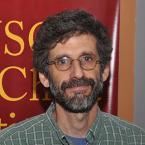Join us for a free one-day workshop for educators at the Japanese American National Museum, hosted by the USC U.S.-China Institute and the National Consortium for Teaching about Asia. This workshop will include a guided tour of the beloved exhibition Common Ground: The Heart of Community, slated to close permanently in January 2025. Following the tour, learn strategies for engaging students in the primary source artifacts, images, and documents found in JANM’s vast collection and discover classroom-ready resources to support teaching and learning about the Japanese American experience.

Goldstein, Joshua
Contact Information
Professor
Dornsife College of Letters, Arts & Sciences
Director, East Asian Studies Center
Office: SOS 260
Phone: (213)821-2603
E-mail: jlgoldst@usc.edu
Education:
- Ph.D. (Modern Chinese History), University of California, San Diego, 2000
- B.A. (Semiotics), Brown University, 1988
Background
Professor Goldstein has been on the USC faculty since 2005. He was an assistant professor at Franklin & Marshall College for 5 years and a visiting faculty member at Yale University in 2002. He lectured at Massachusetts Institute of Technology from 1998-1999. Additionally, Prof. Goldstein serves on the editorial boards of Zhongguo Xueshu and the Chinese Historical Review.
Selected Publications:
- Goldstein, Joshua (2007). "Drama kings: Players and publics in the re-creation of Peking opera, 1860-1937," University of California Press.
- Goldstein, Joshua & Yue Dong, M. (Eds.) (2006). Everyday modernity in China, University of Washington Press.
- Goldstein, Joshua (2003). "From teahouse to playhouse: Theaters as social texts in early-twentieth-century China," Journal of Asian Studies, 62(3).
- Goldstein, Joshua (1999). "The making of a cultural icon: Mei Lanfang and the nationalization of Peking opera, 1911-1930," Positions, East Asia Cultures Critique, 7(2).
- Goldstein, Joshua (1999). "Scissors, surveys and psycho-prophylactics: Prenatal health care campaigns and state building in post-liberation China, 1949-1954." Journal of Historical Sociology, 11(2).
Featured Articles
Please join us for the Grad Mixer! Hosted by USC Annenberg Office of International Affairs, Enjoy food, drink and conversation with fellow students across USC Annenberg. Graduate students from any field are welcome to join, so it is a great opportunity to meet fellow students with IR/foreign policy-related research topics and interests.
RSVP link: https://forms.gle/1zer188RE9dCS6Ho6
Events
Hosted by USC Annenberg Office of International Affairs, enjoy food, drink and conversation with fellow international students.
Join us for an in-person conversation on Thursday, November 7th at 4pm with author David M. Lampton as he discusses his new book, Living U.S.-China Relations: From Cold War to Cold War. The book examines the history of U.S.-China relations across eight U.S. presidential administrations.




